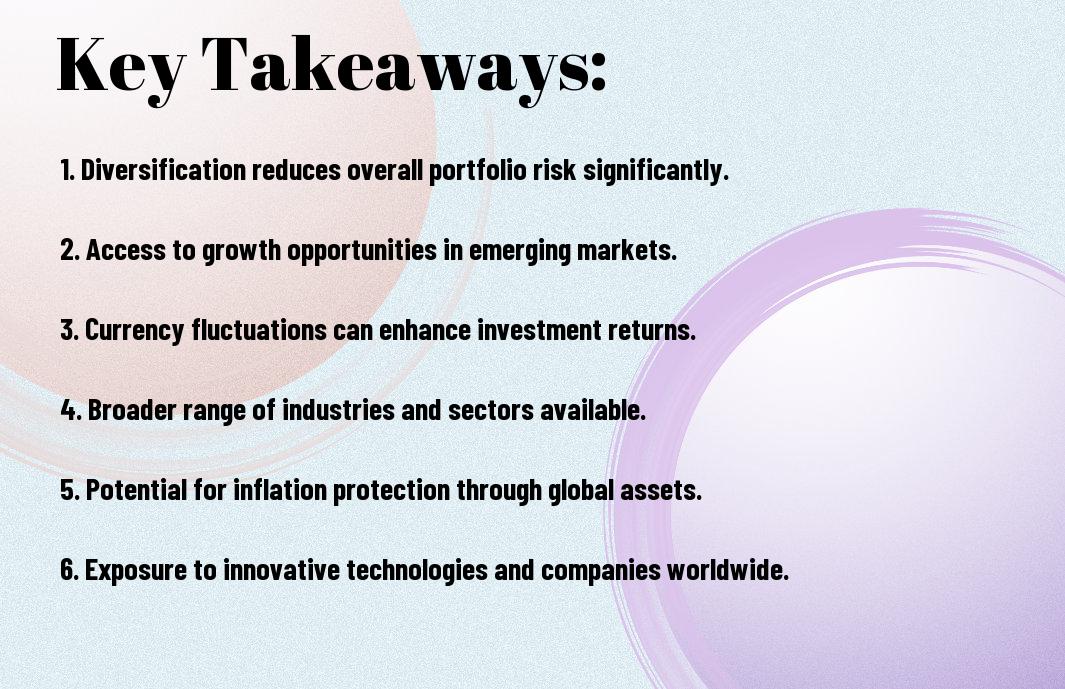Markets around the world offer unique opportunities that can significantly enhance your investment portfolio. By diversifying into international markets, you can take advantage of emerging economies, access different economic cycles, and reduce your risk exposure. Furthermore, investing abroad allows you to tap into industries and sectors not available within your domestic market, potentially leading to greater returns. In this blog post, you will explore the key benefits of expanding your investment horizons beyond borders.
Key Takeaways:
- Diversification: Investing in international markets allows for greater portfolio diversification, reducing risk exposure by spreading investments across different economies and industries.
- Growth Opportunities: Global markets can offer higher growth potential, especially in emerging economies where rapid economic expansion may outpace those of developed markets.
- Currency Benefits: International investments can provide currency diversification, enabling investors to potentially benefit from favorable exchange rate movements that enhance overall returns.

Understanding International Markets
Before you venture into investing, it’s vital to grasp the intricacies of international markets. These markets provide opportunities to diversify your portfolio, as they are influenced by different economic factors compared to domestic markets. Understanding the unique characteristics of various regions can help you make informed investment decisions and potentially increase your returns.
Definition and Scope
Markets encompass a variety of systems where goods, services, and assets are exchanged. International markets specifically involve transactions that occur between countries, emphasizing a global approach. As you explore these markets, you’ll find a vast range of opportunities for investment across diverse sectors and geographic areas.
Types of International Investments
One effective way to gain exposure to international markets is through various types of international investments. These can include direct investments in foreign businesses or market indices, as well as other financial instruments. Understanding these types can help you align your investment strategy with your long-term goals.
| Type of Investment | Description |
| Foreign Stocks | Equities of companies based outside your home country. |
| Bonds | Fixed-income securities issued by foreign governments or corporations. |
| Mutual Funds/ETFs | Funds that pool money from investors to buy international securities. |
| Real Estate | Investing in properties in foreign markets. |
| Currency Trading | Speculating on currency fluctuations in the global market. |
This array of investment options offers you flexibility and the potential for higher returns. Each type of investment comes with its own set of risks and benefits, so it’s important to evaluate which aligns best with your financial goals. By diversifying into international assets, you can mitigate risks linked to domestic economic conditions.
- Direct Investment: Buying a stake in a foreign company
- Exchange-Traded Funds (ETFs): Tracking international indices
- Foreign Real Estate: Acquiring properties abroad
- Global Bonds: Investing in foreign government or corporate bonds
- Forex Markets: Engaging in currency trading
After you consider these factors, you’ll be in a better position to make strategic choices that enhance your investment portfolio.

Economic Diversification
If you seek to strengthen your investment portfolio, exploring international markets can provide exceptional economic diversification. By investing in various geographical regions, you can reduce reliance on a single economy, thereby enhancing your ability to withstand local market fluctuations. This diversification allows you to cater to different economic cycles, ensuring that your investments remain balanced and resilient against changing global sentiments.
Risk Reduction
Below your investments can become less susceptible to localized economic downturns by spreading them across different countries and regions. When one market underperforms, another may thrive, thus offering a buffer against potential losses. This global approach enables a smoother performance over time, providing a safer pathway to achieving your financial goals.
Exposure to Emerging Economies
Against this background, investing in international markets opens your portfolio to emerging economies that offer rapid growth potential. These markets often present opportunities for higher returns due to their developing infrastructure, expanding consumer bases, and increasing domestic spending. Diversifying your investments into these regions can significantly enhance your overall portfolio performance.
Also, tapping into emerging economies allows you to benefit from unique market trends that aren’t always correlated with developed markets. This exposure can result in attractive growth opportunities, particularly as these economies adapt and innovate over time. By incorporating investments in countries like India, Brazil, or Vietnam, you position yourself to capitalize on potential game-changing developments and explore avenues for substantial returns.
Increased Opportunities for Growth
After expanding your investment horizon to include international markets, you open the door to a wider array of potential growth opportunities. Different regions often have varying economic cycles, allowing you to capitalize on areas that may be experiencing growth while your domestic market may be stagnating. By diversifying your investments across the globe, you can better position yourself to take advantage of emerging markets and industries, ultimately maximizing your growth potential.
Higher Return Potential
Growth in international markets often leads to higher return potential than domestic investments. By diversifying your portfolio, you harness the unique opportunities presented by emerging economies and sectors. This diversification helps mitigate risks while optimizing your chances of realizing substantial returns.
Access to Innovative Industries
About investing internationally, you gain access to innovative industries that may not be prevalent in your local market. Many countries are hubs for technological advancements and groundbreaking research, providing you with opportunities to invest in forward-thinking companies poised for rapid growth.
Another impact of accessing these innovative industries is the potential to participate in sectors like renewable energy, biotechnology, and information technology. By investing in these dynamic markets, you position yourself at the forefront of industry trends that can drive high returns. Engaging with these sectors not only diversifies your investment portfolio but also aligns you with global economic shifts, enabling you to benefit from advancements that are changing the world.
Currency Diversification
Unlike investing solely in domestic markets, currency diversification allows you to spread your exposure among various currencies, reducing the risk of currency depreciation. By incorporating international assets into your portfolio, you can enhance returns and provide a hedge against local economic downturns. To learn more about Investing in International Markets: The Benefits and Risks …, continue exploring the advantages this strategy offers.
Mitigating Currency Risk
Among the various strategies to enhance your investment portfolio, mitigating currency risk can significantly protect your returns. By investing in countries with different economic cycles and currency tendencies, you can offset losses in one currency with gains in another. This balance helps ensure that your overall investment remains stable and resilient against global economic fluctuations.
Benefits of Currency Fluctuations
An important aspect of investing in international markets is taking advantage of currency fluctuations. When you invest in assets abroad, changes in exchange rates can lead to unexpected gains or losses, providing unique opportunities. As currencies appreciate or depreciate, your investments may benefit from favorable conversion rates, enhancing your overall return on investment.
Mitigating the risks associated with currency fluctuations can offer investment advantages that many overlook. When currencies fluctuate, even modest changes can maximize your returns when converting profits back to your home currency. Furthermore, diversifying your investments across various currencies helps reduce volatility in your overall portfolio, allowing you to enjoy the potential rewards of international markets without being overly exposed to any single currency’s performance.
Insights into Global Trends
Now is the ideal time for you to explore global trends as they offer insights into investment opportunities that can enhance your portfolio. By observing different markets, you can identify potential growth areas, sectors on the rise, and shifts in consumer behavior that signal lucrative ventures. Understanding these trends will empower you to make informed decisions and capitalize on economic advancements worldwide.
Economic Indicators
Any investor worth their salt knows that economic indicators play a significant role in predicting market behavior. These metrics, such as GDP growth rates, inflation levels, and unemployment statistics, provide a snapshot of a country’s economic health. By analyzing these indicators, you can better assess which international markets are ripe for investment and which ones may pose risks.
Market Analysis Across Borders
Along with understanding economic indicators, conducting thorough market analysis across borders is imperative for successful international investing. This process involves evaluating various factors affecting different markets, such as regulatory environments, competition, and consumer preferences. By engaging in this analysis, you can spot potential challenges and significant opportunities that may not be evident at first glance.
Hence, diving deeper into market analysis across borders allows you to develop a more comprehensive investment strategy. By comparing industries and understanding regional dynamics, you can identify trends that may not be apparent in your domestic market. Leveraging data from diverse sources enables you to stay ahead of the curve and maximize your investment returns. This level of diligence will ultimately enhance your ability to navigate the complexities of global markets effectively.
Strategic Asset Allocation
Not all investments are created equal. By diversifying your portfolio across international markets, you can reduce risk and enhance potential returns. Strategic asset allocation allows you to balance your investments between domestic and foreign assets, ensuring that you capture growth opportunities while mitigating adverse market fluctuations. This approach helps you align your investment strategy with your risk tolerance and financial goals, making it a vital component of your overall investment plan.
Portfolio Balance
Among the most significant advantages of investing in international markets is the ability to achieve a well-balanced portfolio. By incorporating a variety of global assets, you can counterbalance the volatility of your domestic investments. This balance not only stabilizes your portfolio but also opens up avenues for growth in emerging markets and developed economies alike, providing you with a more resilient financial foundation.
Long-term Investment Strategies
One of the key benefits of investing internationally is the opportunity for long-term growth. By focusing on global economic trends and investing with a long horizon, you can take advantage of diverse market cycles and potentially higher returns. This strategy encourages you to be patient and allows the compounding effect of your investments to work in your favor.
But it’s important to stay informed about global economic developments and shifts in market dynamics. Long-term investment strategies require a comprehensive understanding of geopolitical factors, currency fluctuations, and economic indicators. By positioning yourself wisely and remaining committed to your strategy, you can harness the advantages of international investing and build wealth over time, ensuring you reach your financial milestones with confidence.
Conclusion
Drawing together the benefits of investing in international markets, you can diversify your portfolio, mitigate risks, and tap into growth opportunities that may be unavailable in your local market. By exploring these global avenues, you not only enhance your investment potential but also broaden your understanding of different economies. To gain more insights, consider referencing What to Consider When Investing in International Markets. Making informed decisions will enable you to optimize your investment strategy effectively.
Q: What are the primary advantages of diversifying my investment portfolio with international markets?
A: Investing in international markets offers several advantages, including diversification of risk, potential for higher returns, and exposure to new growth opportunities. By spreading investments across different countries and regions, investors can reduce the impact of any single economy’s downturn. Additionally, certain international markets may offer faster growth rates compared to domestic markets, allowing investors to capitalize on emerging trends. Finally, investing globally can provide access to industries and sectors that may not be well-represented in local markets, thereby enhancing overall portfolio performance.
Q: How do currency fluctuations affect my international investments?
A: Currency fluctuations can significantly impact the returns from international investments. When investing in assets denominated in foreign currencies, changes in exchange rates can affect the value of those investments in your home currency. For instance, if the value of the foreign currency rises against your local currency, your investment returns will increase when converted back to your currency. Conversely, if the foreign currency depreciates, it can lead to diminished returns. Investors should carefully consider the currency risk and may choose to hedge their investments to mitigate potential adverse effects.
Q: What factors should I consider before investing in international markets?
A: Before investing in international markets, investors should evaluate various factors, including political stability, economic conditions, market accessibility, and regulatory environments. Understanding the political climate is vital, as instability can lead to investment risks. Economic indicators, such as GDP growth and inflation rates, can help gauge the health of the market. Additionally, investors should assess market accessibility—whether there are any barriers to entry—for their chosen regions. Lastly, an awareness of local regulations and compliance requirements is vital to ensure that investments are made within legal frameworks and to avoid potential pitfalls.


